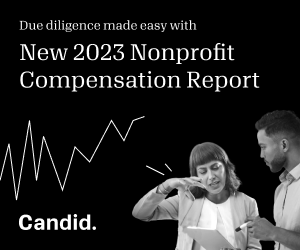LGBTQ+ organizations are disproportionately underfunded. That needs to change.

This year, LGBTQ+ nonprofits across the country have faced unique challenges amid an already difficult year for the sector at large. Those of us in the movement are all too aware that 2023 marks the most hostile year toward LGBTQ+ Americans in recent history, with a record 650-plus anti-LGBTQ+ bills introduced in state legislatures across the country. The dangerous legislation targeting this community—in particular, trans and nonbinary young people who are already victimized at overwhelming rates—has led The Human Rights Campaign to declare a national state of emergency for LGBTQ+ Americans. Movement leaders predict that 2024, a general election year that promises to feature anti-LGBTQ+ rhetoric and action like never before, will be even worse.
The challenging national political climate, amid the already challenging economic environment, has made fundraising for our necessary work a lot more difficult. When you combine those realities with unprecedented protests and boycotts against businesses that support LGBTQ+ causes, the result is a near-perfect storm for LGBTQ+ organizations that rely heavily on philanthropy to operate.
The incontrovertible truth is that the relentless persecution of this community is lethal. For the fifth consecutive year, The Trevor Project’s data underscore that anti-LGBTQ+ victimization contributes to the higher rates of suicide risk reported by LGBTQ+ young people: 41 percent of LGBTQ+ young people seriously considered attempting suicide in the past year—and those who are transgender, nonbinary, and/or people of color reported even higher rates.
Support for LGBTQ+ organizations and causes makes up less than 1 percent of all philanthropic giving in the United States. This significant lack of investment in the field puts LGBTQ+ nonprofits at risk. And as LGBTQ+ issues reenter the mainstream national debate with more vitriolic fuel than ever before, the stakes have never been higher.
Attitudes toward the LGBTQ+ community have shifted significantly in the last several decades. New data from GLAAD confirm that a supermajority of non-LGBTQ+ Americans support equal rights for the LGBTQ+ community and that most people agree that they should have the freedom to live their life and not be discriminated against. Yet, the philanthropic trends we’ve seen—especially this year—do not match the data.
We need all Americans to start showing up in a meaningful way for the LGBTQ+ community with their philanthropic dollars, investing in organizations that can make the change we all agree we want to see: a more welcoming and affirming world for all people. To our allies: We need you, and we need you now.
While we use the acronym LGBTQ+ to encapsulate our vibrant diversity, our community is not a monolith. In particular, trans and nonbinary individuals are facing unprecedented systemized attacks, and it is threatening the lives of trans young people. LGBTQ+ people are our children, neighbors, friends, family, classmates, and colleagues—and their lives are at stake.
The LGBTQ+ movement is grossly underfunded and underrepresented as a share of philanthropic giving. Supporting the health and well-being of young people and protecting them against suicide should not be political simply because these young people happen to be LGBTQ+. If you support the LGBTQ+ community’s right to survive and thrive, make your allyship tangible and direct your philanthropy to this movement that desperately needs your support.
Even as we end one record-breaking year for anti-LGBTQ+ policies and anticipate another in 2024, it’s important that we remain hopeful. In 2023, despite the hundreds and hundreds of anti-LGBTQ+ bills introduced, nearly 90 percent were defeated. Adversity is nothing new for the LGBTQ+ community. History has shown that, despite the obstacles and injustices we have been forced to endure, our community is resilient. But the burden shouldn’t be solely on us; now is the time for allied philanthropists to step up in defense of LGBTQ+ people. It truly will take all of us.
Tina M. Barber is director of community philanthropy at The Trevor Project.







Building and sustaining movements in the South: The crucial role of intermediaries